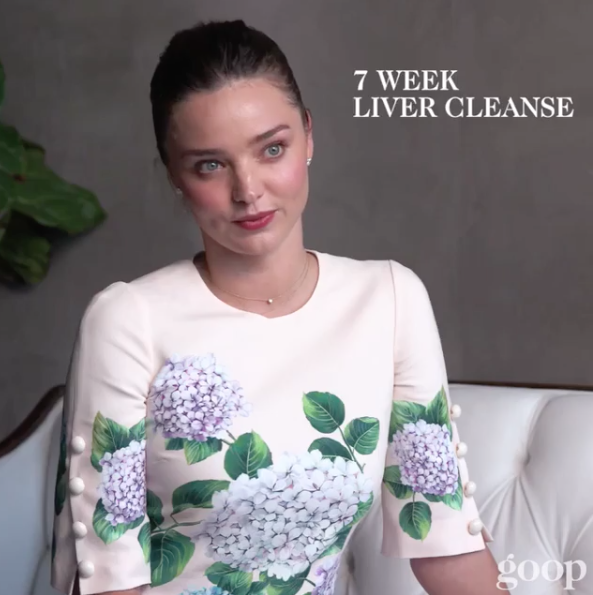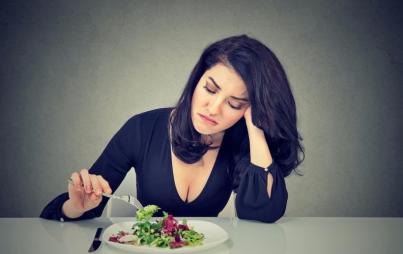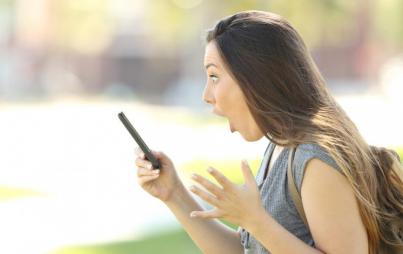
I have seen “clean eating” designed as everything from a cock-full-o-meat paleo diet, to a vegan diet and plenty of eating plans in between. I’m “good” if I eat some broccoli, but “bad” if I eat it with cheese sauce? (Image Credit: Instagram/goop)
We live in a culture where people mistake the stereotype of beauty for everything from morality, to work ethic, to healthcare qualifications. One of the places this becomes the most apparent is in celebrity diet culture. There isn’t a single study where more than a tiny fraction of people have maintained any amount of weight loss long term (and even among those, the weight lost is incredibly small), but we’re supposed to believe that because someone is thin and talented, they hold the secret to weight loss and/or healthy eating — and let’s remember that these are most definitely two different things.
We also live in a culture that encourages us to have a seriously messed up relationship with food. Chips are a “guilty pleasure," but baked chips are “guilt free?” Desserts are “decadent” and vegetables are “clean” (and I don’t mean given a good scrub in the sink).
I have seen “clean eating” designed as everything from a chock-full-o-meat paleo diet, to a vegan diet and plenty of eating plans in between. I’m “good” if I eat some broccoli, but “bad” if I eat it with cheese sauce.
Then there’s our society’s bizarre insistence that we make all food into a performance — from the obligatory “This is so much food, I could never eat all of this” we’re obliged to say when our plate comes in a restaurant, to our tendency to discuss why we are or aren’t eating a particular food (and I’m not talking about in the context of allergies or sensitivities). Or how many minutes on the treadmill we feel we have to do to “make up” for eating whatever we’re eating, how “good” or “bad” we are being with our food choices.
And we have these discussions with whatever rando strangers are also in line at Chipotle.
Combine those three things and you get the total cock up that is celebrity diet culture. In his piece “Clean eating websites like Gwyneth Paltrow's Goop 'indistinguishable from pro anorexia sites,'” Dr Christian Jessen wrote:
“I’ve had many, many patients, so many of them teenagers, convinced that their healthy lifestyle and their clean-eating regime was really helping them when actually all it was doing was helping them hide their increasingly disordered eating and to cover up an underlying eating disorder.”
Perhaps even more concerning are healthcare practitioners who are caught up in the biases of our cultures and thus encourage this kind of behavior instead of recognizing the red flags. Those flags include disordered eating and eating disorders including Orthorexia, a term that literally means “fixation on righteous eating.”
It’s also important to remember that “health” can be a moving target. It’s not an obligation or a barometer of worthiness, it’s not entirely within our control, and it’s not guaranteed, no matter what we do.
There’s nothing wrong with wanting to support your body by giving it good nutrition, but it’s important to remember that healthy eating and food restriction rarely go hand in hand. (Of course, there are cases where food restriction makes great sense — including allergies, sensitivities and health conditions.)
It’s also important to remember that “health” can be a moving target. It’s not an obligation or a barometer of worthiness, it’s not entirely within our control, and it’s not guaranteed, no matter what we do.
You Might Also Like: To The Fat-Haters: Health Is Not A Moral Issue
Each of us should get to decide how we want to define health for ourselves, how highly we want to prioritize it, and the path that we want to take to get there. (Unfortunately, for many people these choices are limited by things like lack of access to healthcare, the inability to find or afford the food they want to eat, and the severe lack of non-biased accurate information about health.) If people want to concern themselves with other people’s health, then they should focus on bringing down these barriers to access and allowing other people to choose their own path to health.
And it seems to me that path will be much less fraught if we approach health from a non-diet, non-restrictive, weight-neutral method like Health at Every Size.
When we start with an appreciation for our bodies, and we focus on food not just as a source of fuel, but also as part of our culture and a source of joy, we set ourselves up to have a healthy relationship with food, and to support our health overall.
If you are worried that you might have, or be headed towards, an eating disorder you can complete this quick screening from the National Eating Disorders Association.







